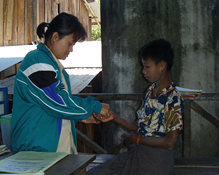
Malaria has played a devastatingly significant role in human history – and today half the world’s human population are at risk of malaria. The enormous human cost makes it imperative that we do aim to eliminate malaria in all countries, and a total of USD $3.1 billion was spent globally in 2017 attempting to get closer to this goal.
But how close are we to eliminating malaria? BugBitten asked experts, who have spent much of their careers ‘on the front line’ in the fight against malaria, for their views on this question.
Dr Elizabeth Ashley is Director of Clinical Research at the Myanmar Oxford Clinical Research Unit and an Associate Editor of Malaria Journal

“World Malaria Day in 2019 marks 20 years since the publication of a memorable paper entitled “Averting a malaria disaster”, prompted by high level chloroquine and sulfadoxine-pyrimethamine resistance across Africa. Since then there have been notable successes in malaria control including reaching the goal of elimination in a few countries. However, of late, the end goal of global elimination seems to be slipping out of reach, in the face of growing threats of drug and insecticide resistance. Renewed commitment, increased funding, and innovation are needed to turn the tide, and avoid drifting towards a malaria disaster that would represent a failure to protect public health.”
Sir Brian Greenwood is Professor of Clinical Tropical Medicine at the London School Hygiene and Tropical Medicine

“This is a difficult question to answer as the answer is both yes and no. Good progress is being made towards elimination of malaria in an increasing number of countries where, in recent years, exposure to malaria infection has been low. However, in many countries, mainly countries situated in sub-Sharan Africa, progress in malaria control has stalled and these countries are still a long way away from elimination. Realisation that this is the case has led WHO to initiative a new ‘10 + 1’ programme which will focus on ten high burden countries in Africa together with India. It will be interesting to see what approaches are developed to enhance malaria control in the 10 + 1 countries. My view is that some new tools will be needed, perhaps a novel approach to vector control such as gene drive mosquitoes, or a highly effective vaccine before elimination will be achieved in these very high burden countries.”
Dr Justin Cohen is Vice President, Global Malaria at Clinton Health Access Initiative

“In the last few years, malaria incidence has declined sharply in parts of Central America and the Mekong, among other places, though elsewhere cases have plateaued or increased. But better than focusing on case counts is to ask whether we’ve built up essential country-owned systems that can keep driving down malaria and secure sustainable elimination. Getting on the right track for permanent gains against the tricky problem of malaria requires helping endemic countries build strong systems for routinely diagnosing and treating malaria, collecting high resolution disease data, and analysing the information available to understand what responses are needed. Making sure most people who are sick with malaria are diagnosed and treated appropriately will reduce the burden of disease and drive down transmission to some extent, while understanding the patterning of where transmission persists can let us allocate our limited resources as efficiently as possible to appropriate vector control tools and other interventions, enabling additional gains. These systems will likely be sufficient to achieve malaria elimination in lower endemic areas, while enabling meaningful and sustainable reductions in malaria everywhere.”
We need to keep talking about AND acting on malaria
Eliminating malaria – and keeping it eliminated – will help improve the lives of so many people, but this can only be achieved with continued funding and effort (from researchers and society in general). It is therefore important to keep malaria on the political and social agenda beyond World Malaria Day. We invite you to share your views on malaria elimination via twitter @malariajournal – or perhaps by writing your own article for BugBitten (please email srimathy.sriskantharajah@biomedcentral.com for more information).
Furthermore, Malaria Journal will host debates on topical malaria questions throughout the year, and you will get the chance to let us know which side of the argument you find yourselves.


Comments